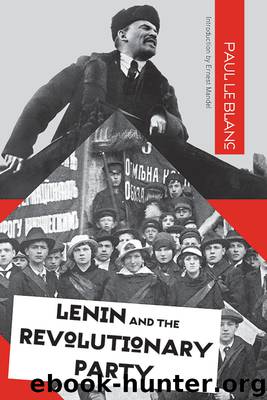Lenin and the Revolutionary Party by Paul Le Blanc

Author:Paul Le Blanc
Language: eng
Format: mobi, epub
Tags: ebook, Political Science
ISBN: 9781608466771
Publisher: Haymarket Books
Published: 2016-01-07T04:30:00+00:00
10.
Party and War
The outbreak of the First World War, in August 1914, disrupted the combined revolutionary and Bolshevik upswing in Russia. It also provided a new and severe test for all revolutionary currents in that country throughout the world. The result was both the devastation and the transformation of the international socialist movement, generating a revolution within Marxism of which Lenin became the foremost proponent. Out of this upheaval came the Bolshevik Revolution, which became the inspiring beacon for those who would change the world.
Some writers have overstated the theoretical shifts entailed by this revolution within Marxism. The young Antonio Gramsci, the “early” Georg Lukacs, Karl Korsch, and others identified as “praxis theorists” or “Western Marxists” were inclined to invoke Lenin’s authority to justify their own innovative (often idealist and voluntaristic) reinterpretations of Marxism. Perhaps the most extreme example was Gramsci’s suggestion that “the Bolshevik Revolution . . . is the revolution against Karl Marx’s Capital. . . . Events have exploded the critical schema determining how the history of Russia would unfold according to the canons of historical materialism.” Although they soon became aware that this distorted Lenin’s Marxism (offering initial formulations in some ways closer to the Bolshevism of Bogdanov than to that of Lenin), later writers have been influenced by their early views.1 Some have seen almost an “epistemological break” in 1914 that divides Lenin’s thought more fundamentally than he himself would have accepted. It has even been argued recently, by the late Steve Zeluck, that the Leninist conception of the party came into existence only with World War I, which yielded Lenin’s “theory of monopoly capital, imperialism, and the presumed theory of a labor aristocracy.” Zeluck asserts that only then was “the theoretical basis . . . laid for Lenin to emerge from his Kautskian shell both politically and organizationally, and break with the Mensheviks of all varieties and nationalities on principle.”2 As we have seen in previous chapters, this is not the case. At least for Russia itself, the essential components of the Leninist party had become fully developed theoretically in the years 1903 to 1914.
Nonetheless, in the 1914–1917 period Lenin’s thinking underwent a profound reorientation. The eruption of World War I and the collapse of the Second International forced him to deepen his understanding of Marxism in order to develop a better analysis of capitalist reality and a more sharply focused revolutionary strategy. In his Philosophical Notebooks he labored to attain a surer grasp of the dialectical philosophy of Hegel, which had been an essential source of the Marxist method. He developed a critique of the vulgarization of Marxist theory and the abandonment of revolutionary politics that had come to characterize the “orthodox” center of the Second International. He found it necessary to study more closely new trends in the world economy, producing Imperialism, the Highest Stage of Capitalism. Related to this, he sharpened his understanding of nationalism and produced a more advanced Marxist approach to this thorny question. And he pioneered in the
Download
Lenin and the Revolutionary Party by Paul Le Blanc.epub
This site does not store any files on its server. We only index and link to content provided by other sites. Please contact the content providers to delete copyright contents if any and email us, we'll remove relevant links or contents immediately.
| Arms Control | Diplomacy |
| Security | Trades & Tariffs |
| Treaties | African |
| Asian | Australian & Oceanian |
| Canadian | Caribbean & Latin American |
| European | Middle Eastern |
| Russian & Former Soviet Union |
The Secret History by Donna Tartt(19028)
The Social Justice Warrior Handbook by Lisa De Pasquale(12182)
Thirteen Reasons Why by Jay Asher(8883)
This Is How You Lose Her by Junot Diaz(6872)
Weapons of Math Destruction by Cathy O'Neil(6261)
Zero to One by Peter Thiel(5782)
Beartown by Fredrik Backman(5734)
The Myth of the Strong Leader by Archie Brown(5491)
The Fire Next Time by James Baldwin(5423)
How Democracies Die by Steven Levitsky & Daniel Ziblatt(5211)
Promise Me, Dad by Joe Biden(5139)
Stone's Rules by Roger Stone(5079)
A Higher Loyalty: Truth, Lies, and Leadership by James Comey(4946)
100 Deadly Skills by Clint Emerson(4911)
Rise and Kill First by Ronen Bergman(4775)
Secrecy World by Jake Bernstein(4738)
The David Icke Guide to the Global Conspiracy (and how to end it) by David Icke(4696)
The Farm by Tom Rob Smith(4500)
The Doomsday Machine by Daniel Ellsberg(4481)
